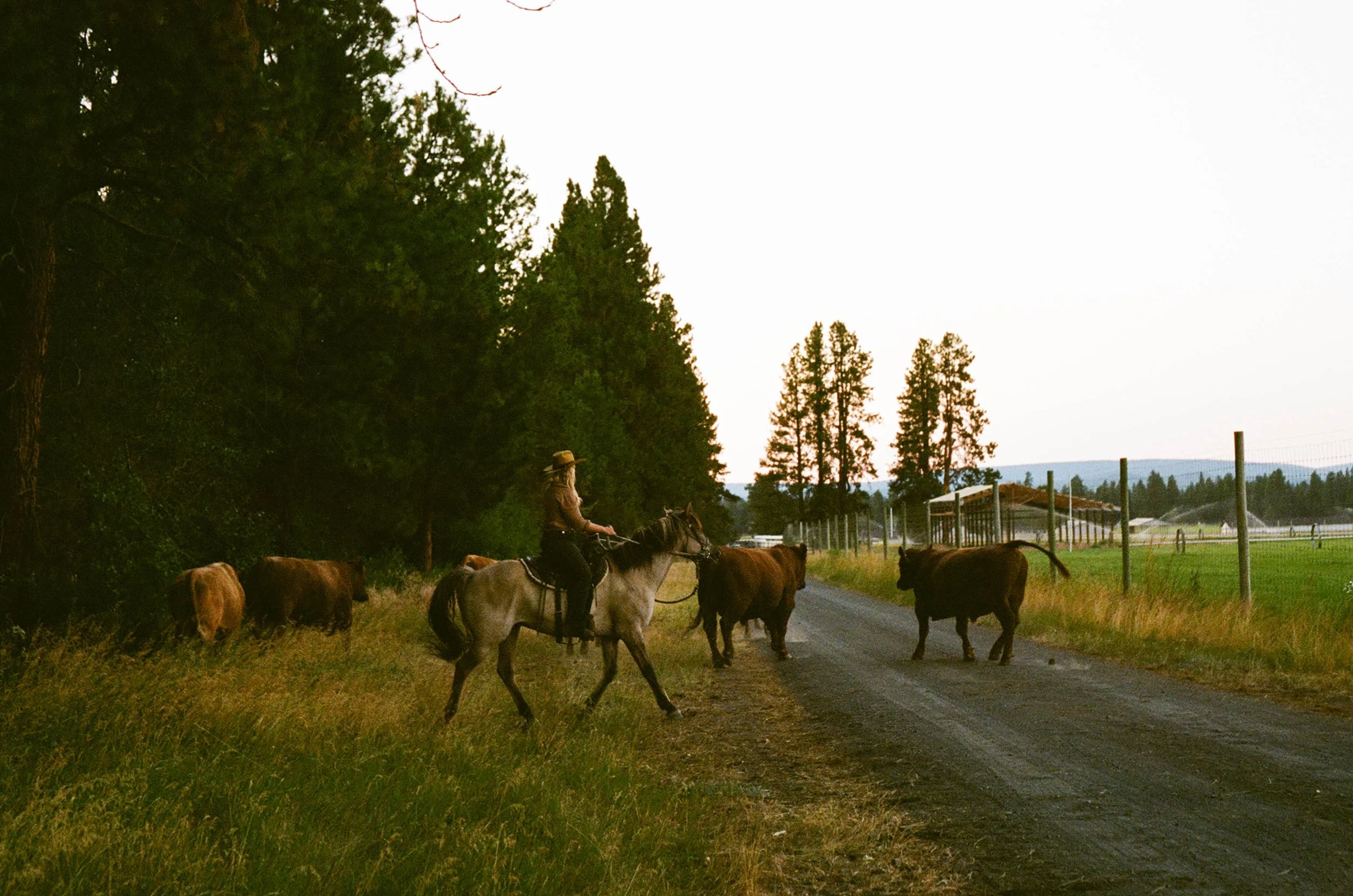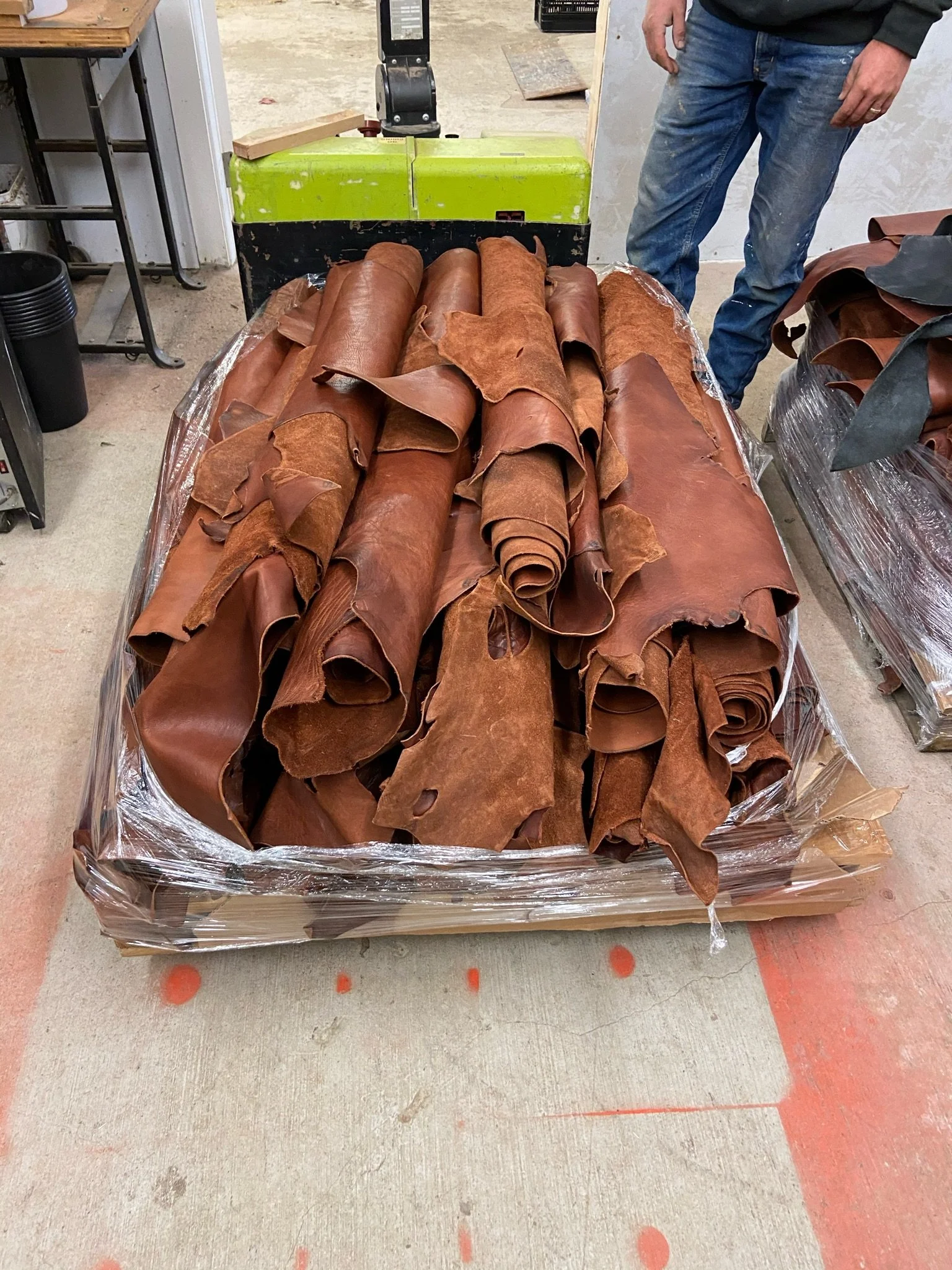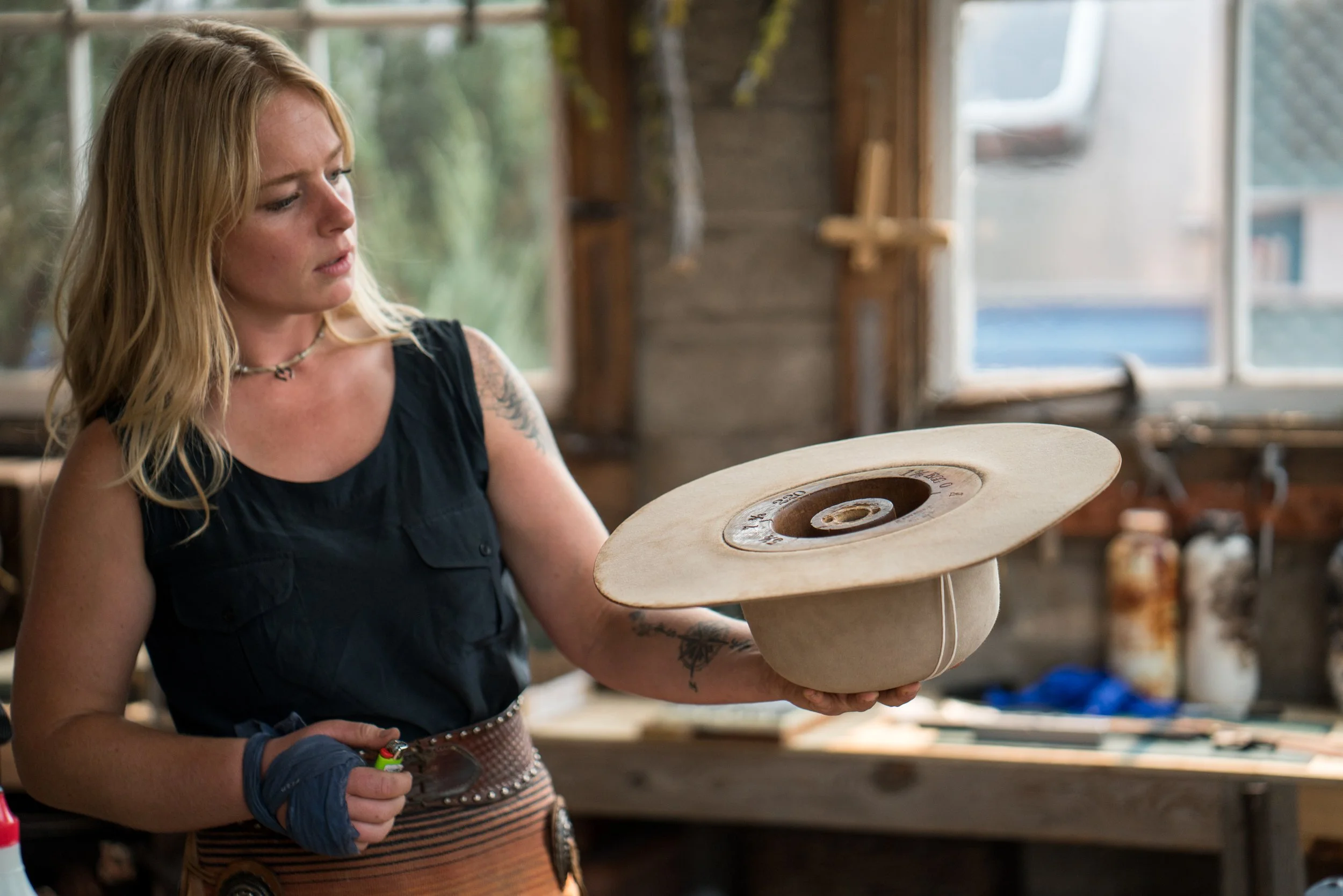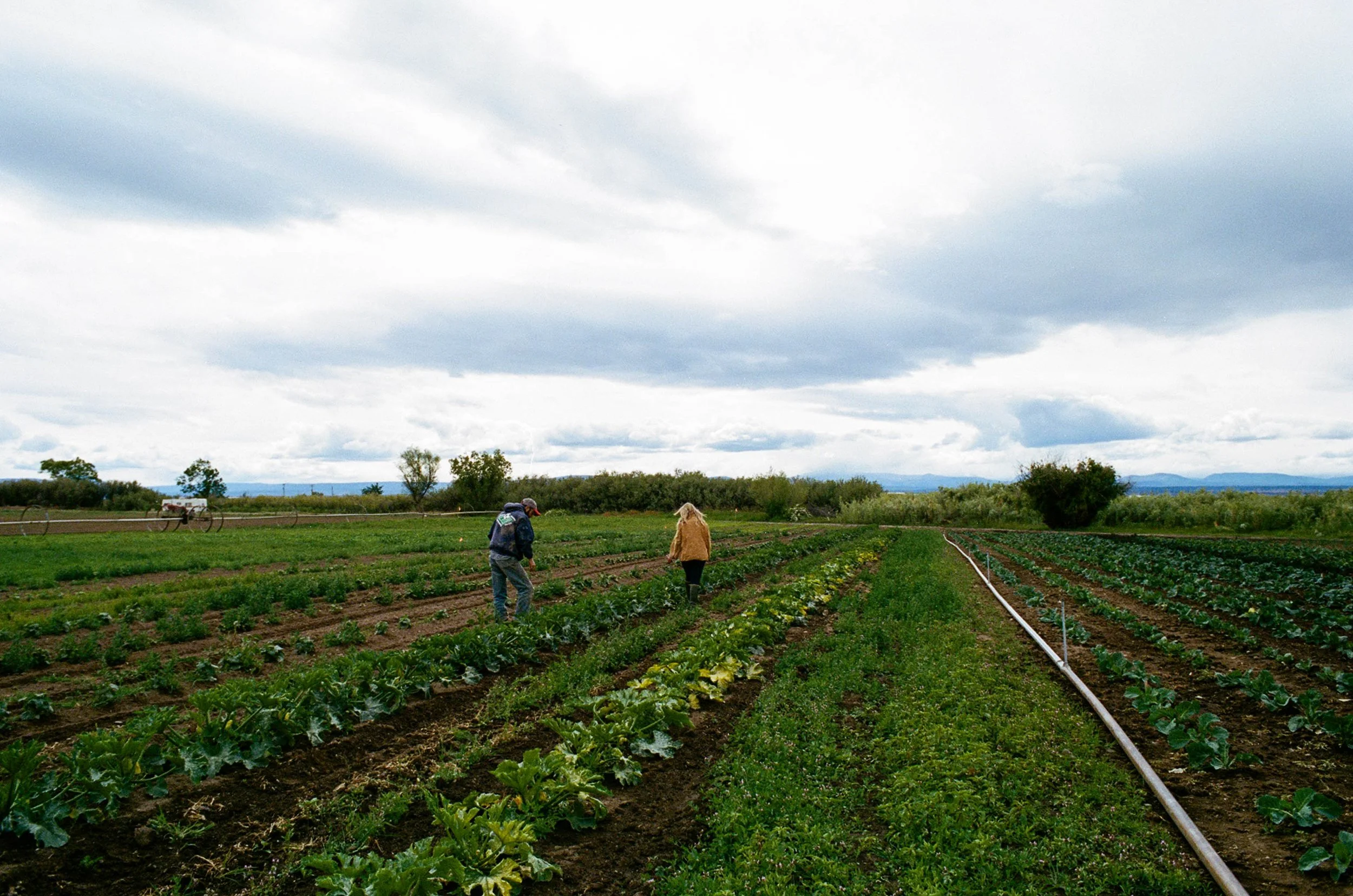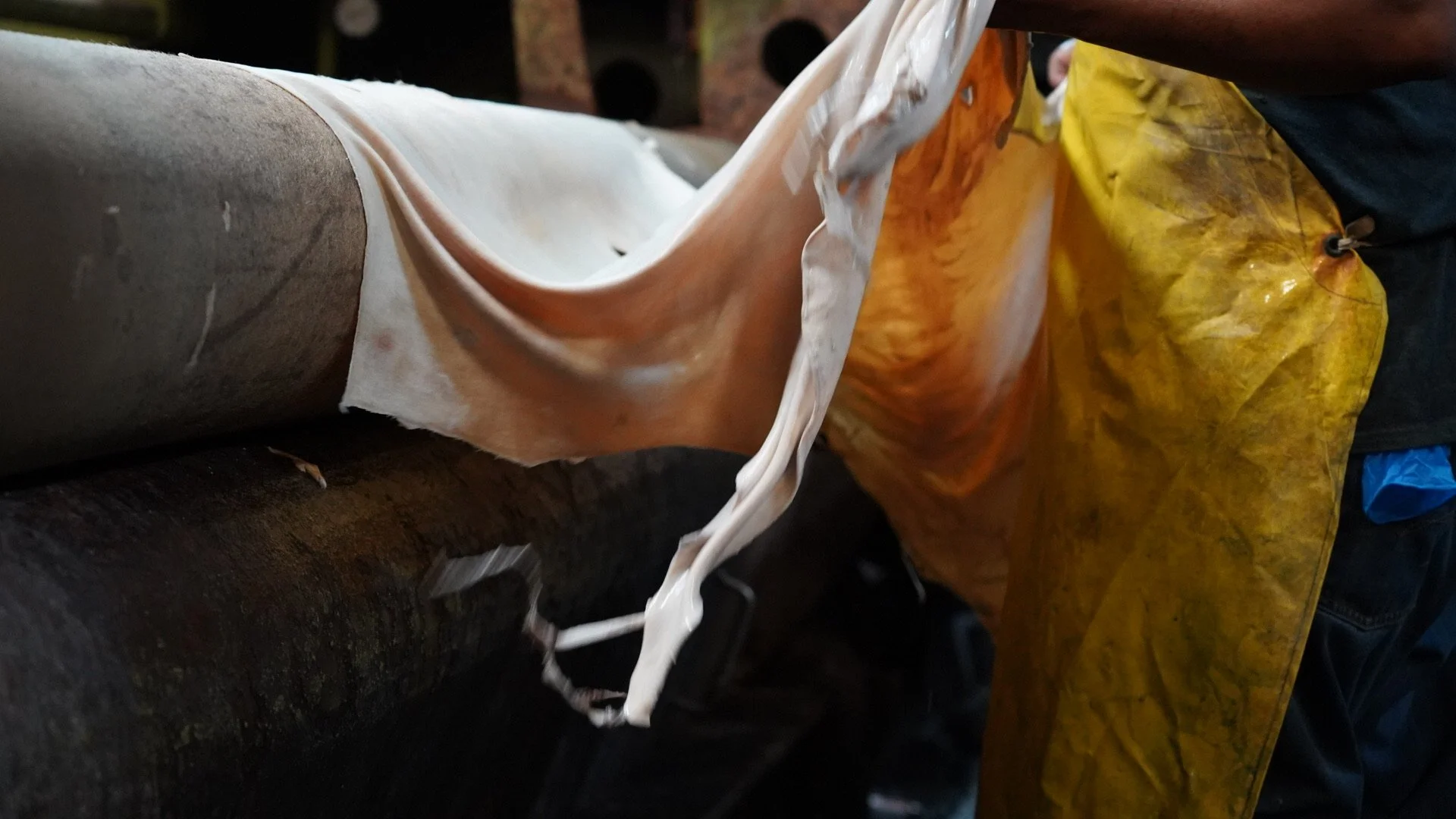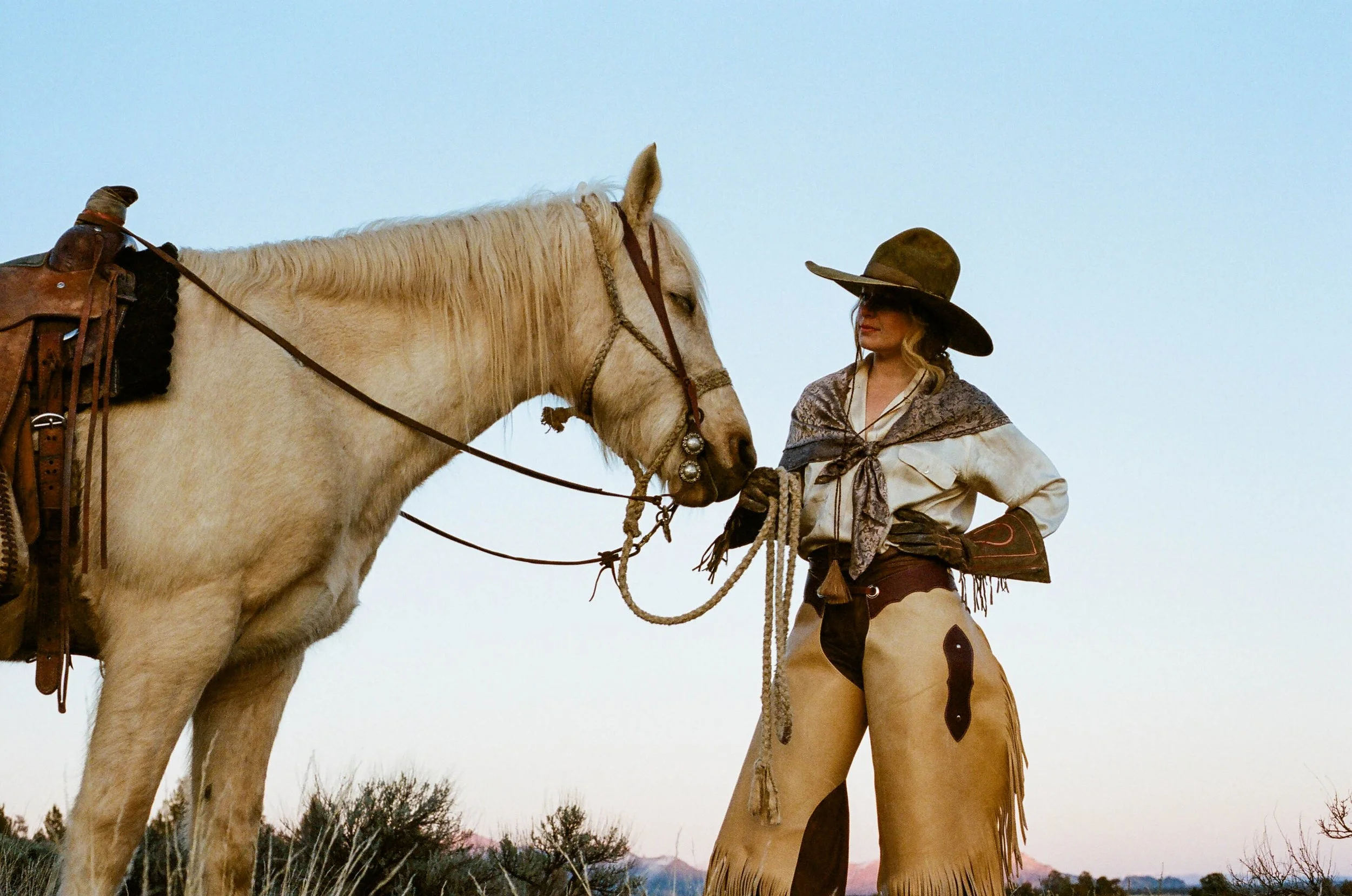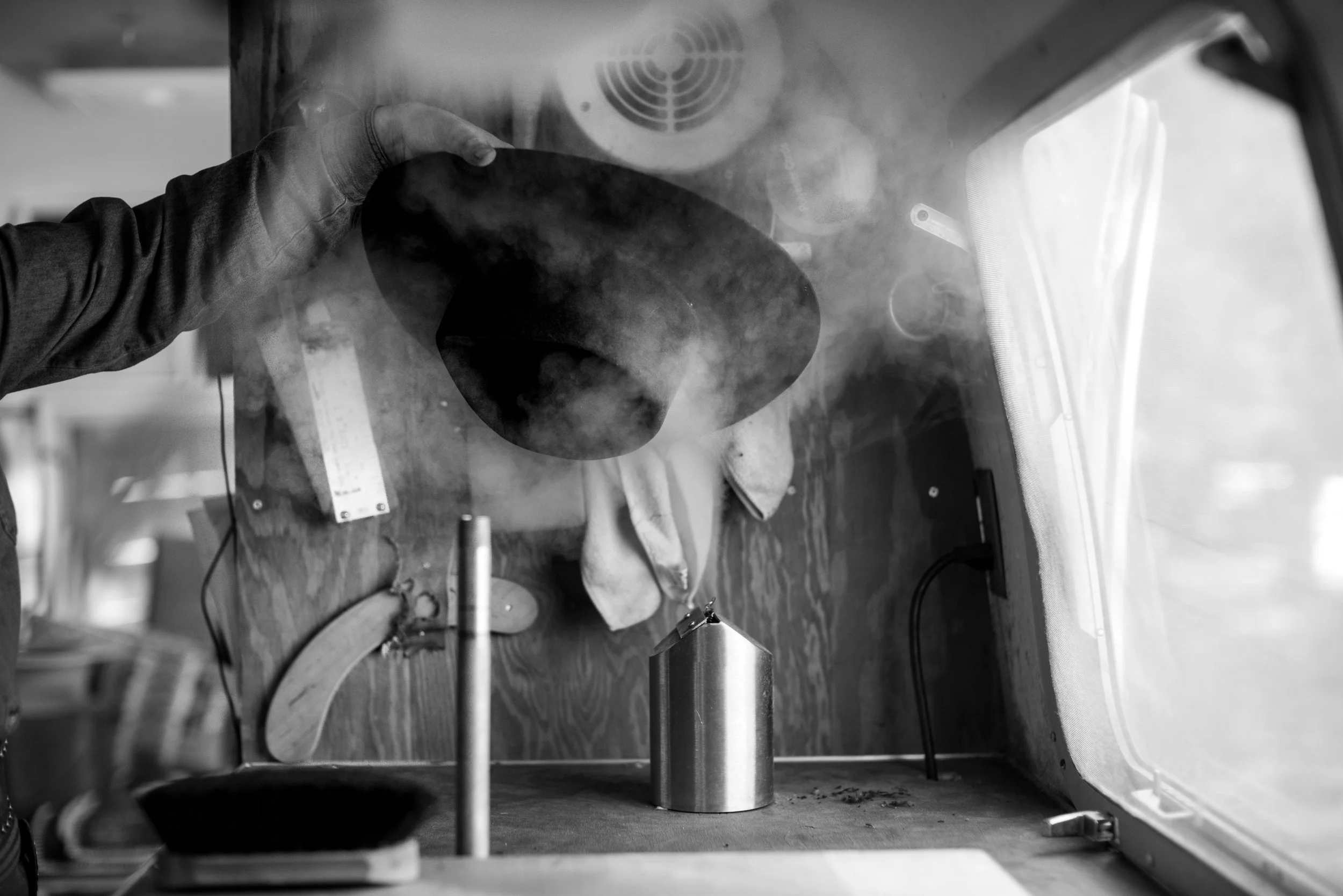
Ranching, Entrepreneurship and Regenerative Fashion: An Interview with Cate Havstad-Casad
Interviewed by Sophie Tsairis
Cate has built a life that defies simple categorization. A rancher, Western hat maker, designer, and founder of the regenerative leather goods company Range Revolution, Havstad embodies the modern renaissance woman. With unwavering determination and vision, she's transforming the fashion industry's approach to leather sourcing while managing a ranch alongside her husband and raising two young sons. In this candid conversation, Cate shares her journey from apprentice hat maker to industry innovator, the evolution of her farming operation, and how she's working to create transparent, sustainable supply chains that honor both the land and the producers who steward it. Her story is one of resilience, adaptation, and refusing to accept "business as usual" when it comes to both agriculture and fashion.
Cate has been a member of this community for many years. She was one of our presenters at our first Confluence, attends events, and participates in community. Most recently, she is supporting WIR by generously donating a portion of sales proceeds from her exciting new collaboration with actress Beth Behrs (which we'll explore in more detail shortly).
The following interview has been edited for clarity and brevity.
Q: Give us the quick and dirty. What should people know about you?
A: My husband and I have a farm and ranch in Madras, Oregon, and two wild boys. We started farming together in 2014 on my husband’s first farm. Over the years, it has evolved significantly, and we have, too. When I first became involved in the farm, I was apprenticing to become a Western hat maker. I've been doing both of those things for over 11 years now.
Q: How has your career path developed over time?
A: My hat business was my main source of income and focus for a long time. When I became a partner in the farm business, my role evolved from just participating to being much more involved in running the business. In 2021, I started a new company called Range Revolution, a leather goods business sourcing cattle hides from American ranches that manage lands regeneratively. After 2 years of selling direct to consumer, this year, we're starting to build a wholesale B2B component supplying regenerative leather to other brands.
Q: How has your farm operation changed over the years?
A: We were initially leasing near Bend, Oregon, with a vegetable-focused organic farm model that included some animal/meat sales. We were scaling wholesale vegetable production, but Bend is one of those places where land is expensive and very fractured, so we were scattered across many leases.
We moved the farm to Madras in 2017 to expand acreage and consolidate it into two parcels, one of which we own. Today, we manage 1,400 acres, built brick by brick each season.
The model of the farm has changed dramatically, primarily driven by water loss. It's a very arid region, and starting in 2020, water allotments were cut because of drought and politics. At the height of the cuts, we received only 20% of our usual water allocation – that's like any business operating without 80% of its capital.
We were awarded a grant in 2021 to build a direct-to-consumer meat box business and pivoted very quickly from vegetables to about 100% reliance on meat sales from our cattle and pigs.
Q: Tell us about Range Revolution. What's the mission behind the brand?
A: Range Revolution is a leather goods company crafted from regenerative American leather. We create heirloom quality purses, travel luggage, and accessories. This year we are creating our first cowboy boots in collaboration with our friend and actress Beth Behrs!
RR began because I saw two problems that needed solving. First, because of our own expansion into the meat business, I started understanding the dilemma of raising cattle just for beef. Only about 65 percent of each carcass is utilized with a mid-size operation like ours. There's no system in place for utilizing the fat, bones, and hides for producers that live in the “ag of the middle” category. We actually pay to dispose of almost 35 percent of each carcass, a cost passed on to most producers like us. It's extremely expensive to deal with this waste, so I wanted to find a way to improve the economics for ranchers.
Secondly, if all these hides go to the trash, that's about 5 million cattle hides disposed of nationally every year. It's a huge waste. I found very little transparency when I investigated where commercial leather comes from. Digging deeper, I discovered that many commodity leathers come from hides that can be traced back to international systems of deforestation.
These were two glaring problems that could be solved with the right approach to design. Of course, saying that aloud is much easier than addressing these problems.
Q: How would you describe "regenerative" in your context?
A: Within the fashion industry, I see regenerative practices as being about creating a beautiful, healthy ecosystem, focused on natural fibers. Many don’t know that today about 70% of the textiles that make up our fashion industry are petroleum based synthetics. Since the 1950s the rise of synthetics has polluted our earth and decimated markets for natural fibers. A more regenerative future of fashion is a return to natural fibers, sourced from and supporting regenerative operations.
I believe fashion is all about aspiration – projecting who we are or aspire to be through style. There's an opportunity to redefine what is aspirational, move beyond money, power, and wealth, and move toward environmental health and sustainability.
We need to educate consumers that leather is not just leather and that there are vast differences in how it's produced. Fashion has a huge opportunity to reconnect popular culture to where things come from and recognize how our choices contribute to the world we say we want or the world we don't want.
Q: How do you source regenerative leather?
A: Currently, we're sourcing hides from regenerative California ranches for Range Revolution. In the past we have worked with hides from ranches in Minnesota & Georgia as well. We're working on our first two wholesale clients' orders right now, which are established fashion brands. We have worked for 4 years rebuilding the supply chain and working out the kinks of making this work scaleable.
There is so much nuance to leather. We've been learning about the capabilities of different tanning methods, the strengths and weaknesses of the supply chain, patterns, tannery partners, trucking, and transport. There's still a lot to learn about what it takes to build a sustainable supply chain.
Q: What's your vision for the business?
A: My vision for building a regenerative leather supply chain is based on what we know from nature: there's no resilience when things are consolidated or in a monoculture. While it would be really helpful to have commitments from big brands, when supply chains rely only on those brands, they are very vulnerable.
I see a future with many mid-sized companies like Range Revolution as part of the system. As brands commit and drop out, it won't disrupt the system in such a significant way.
Q: Tell us about your new collaboration with Beth Behrs. How did this originate?
A: Beth came to me with this idea about a year ago, and we've been sitting on it since then. We formed a friendship back in 2016/2017 when she came out here to build her hat with me. We just bonded and have stayed in touch. She's a very authentic, down-to-earth, curious person. She feels like one of the perfect people to collaborate with because she authentically understands and believes in this mission and can bring light to the work we're doing.
I don't see Range Revolution becoming a boot brand, but a collaboration with someone like her is a perfect way to test the appetite for something like this. With every new endeavor, we learn about different types of leather, create the leather for boots, and open up knowledge – there's layered learning in this process. The boots will support American regenerative ranches. We're on track to launch this fall with two styles to start.
Q: You've chosen to support Women in Ranching with each of your launches. Can you talk about how your relationship with WIR began and why you've continued your support?
A: I tuned in for my first gathering with Women in Ranching in 2020. I appreciate how special and important it is to be around people who share this way of life—the challenges and joys unique to this industry. In rural areas, you can feel isolated, sometimes surrounded by people you might not align with.
What we face as women in rural areas is different from what women in cities or other industries face. I attended the first in-person Confluence in California this year. I can't put into words what it did for my soul to be in community with women in this way of life. It uplifts, soothes, makes me feel seen. Knowing we all are being seen and held is medicine for everybody.
The gathering was an opportunity to reconnect with people, but I also met so many incredible women whose lives might not have crossed with mine otherwise. When you're given these places to feel held and seen, it gives you a platform from which you feel like you can spring out into the world.
The morning after the Confluence, I landed at SXSW, sitting on a panel and speaking with some of the top designers in the world. The first thing I felt compelled to say was that I had just left the company of some of the most incredible women you would ever meet, and I was vibrating with their stories and energy.
When I'm put into these spaces, I can't help but carry these women's stories with me. WIR means reconnecting, feeling held, and having a platform from which I can take in the shared experience of these other women. I'm no longer speaking just through my own perspectives. I don't take it lightly. It's not just me speaking; it's a collective consciousness.
Q: How do you balance the ranch with your other business endeavors?
A: I'm not balanced. I've gotten very comfortable knowing that when you're pushing the limits of what you're capable of, you're not going to feel balanced. Sometimes I feel like an excellent mom, and sometimes I don't. Sometimes I'm an excellent businesswoman, and sometimes, when I’m focused on other priorities like family, I'm not.
I've let go of the pressure of having to figure out the balance. In this new chapter with children, my old version of productivity has changed a lot.
We have daycare, which is the only way I'm able to do what I do. I block out my days differently for different things. Generally, I'm working on Range Revolution nearly every day and dedicate about two days a week to administrative tasks for the farm. Every day there's something on the ranch to do. During hay season, I might run a bailer and help my husband.
My hat work is now very minimal – it's my meditation, the simplest part of my life. I might spend only one day a week on it during this chapter while I’m building Range Revolution and raising babies.
I'm still carrying all three businesses because I love them all for what they add to my life. They each provide something different that contributes to a wholeness that I feel.
Q: Do you have any advice for women in this community who are thinking about diving into a passion or business and are feeling anxious about going all in?
A: You don't have to know everything. You don't have to have it all figured out. Do your best to take it day by day and challenge by challenge – the path will unfold. I say this from experience, try not to add anxiety. Don't be afraid to ask for help or admit when you don't know something.
I've had to fundraise to create Range Revolution and do this work so far. Learning to raise money for something that felt important to me was uncomfortable. I was afraid to look stupid. The most helpful thing was having early-stage investors who understood I didn't know how to do it yet. Nobody knows until they start doing it, no matter what it is.
Don't be afraid to be a beginner. You have some sort of capital – social, financial, perspective, relationships. You have some kind of capital to bring to the table that's valuable.
Some people wait to feel ready or worthy. You just start, and you’ll find your way if you take one day at a time, one challenge at a time.
Q: What do you see for yourself in the short and long term?
A: In the short term, my word for 2025 is "reclamation" – that refers to my own personal reclamation of things I've put on the back burner while I've been sprinting. I'm making time and space for the things I love, like a flower garden for pure joy. I'm establishing some nonnegotiables. I'm still going full steam ahead but reframing that I do have time for these things that make me the happiest version of myself.
In the next 10 years, we'll be in a different place. I want to see Range Revolution successful on a scale that changes the industry and how it thinks about sourcing and transparency – challenging the status quo of the fashion industry.
Q: Any thoughts to leave us with?
A: What I don’t want to do is paint an unequal picture of my experiences in business and ranching. With all the incredible growth and opportunity, I’ve also had extremely challenging years: mental health challenges, traumatic births; I’ve completely lost my footing in the world and forgotten who I was and had to refind myself. At times I’ve been petrified whether our farm would survive, and my marriage has been challenged.
The first time I heard Amber speak, I think it was on the Mountain and Prairie podcast, she said something like, “Sometimes you just gotta sit in the shit.” I didn’t know her yet, but hearing her say that was so refreshing, and it ties back to me just letting go of the attempt of finding balance.
She said something about letting go and acknowledging “this is a shitty time, it won't always feel shitty, and I’m not going to add more shittiness by fretting about the shittiness.”
When we open up and share our stories, the good and the challenging and the hard, we never know what women are out there that might need to hear that to feel less alone and isolated.
I’ve been in the shit, I’ll be back in the shit no doubt, and you’re not alone.
May 16th, 2025
